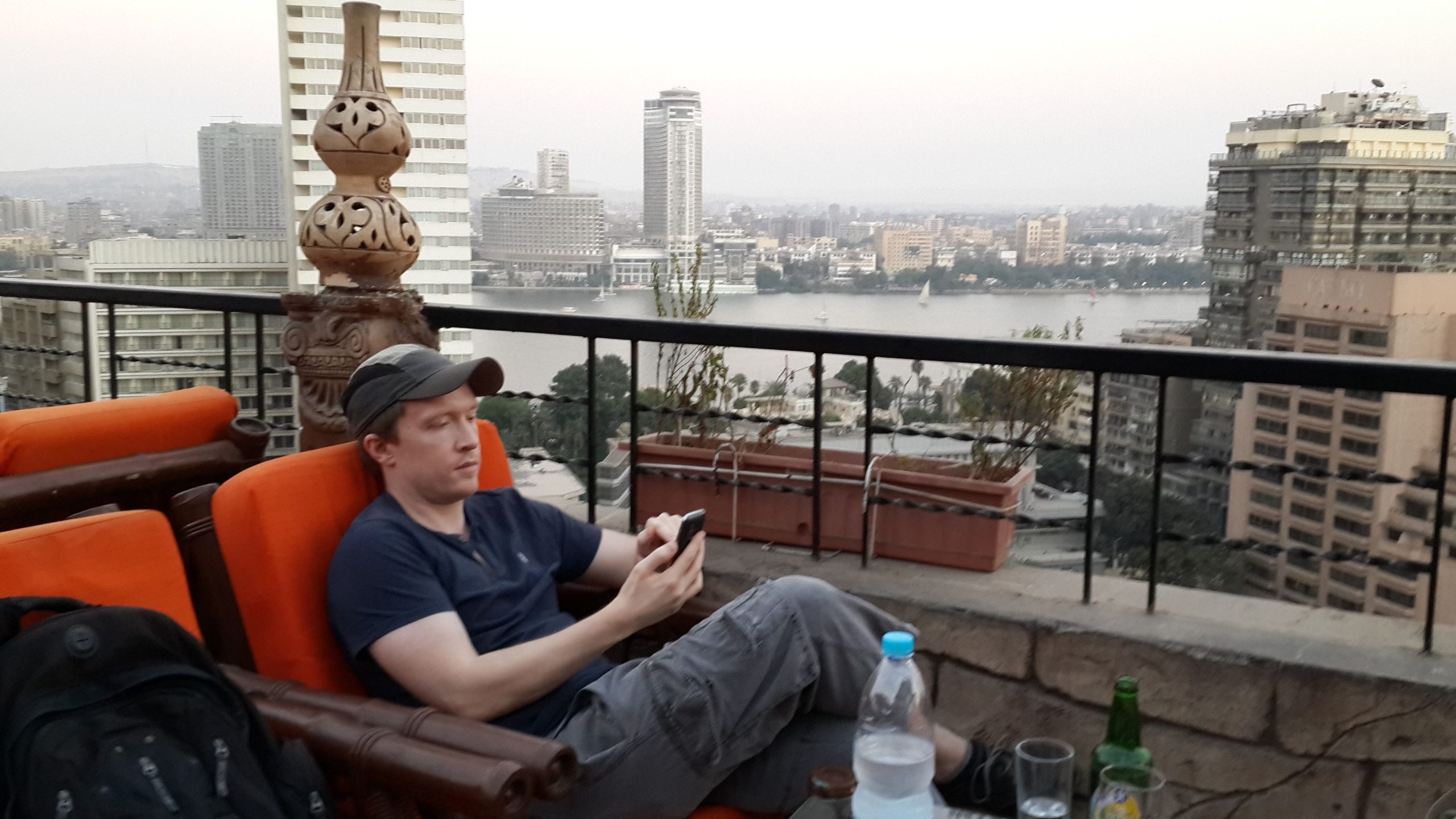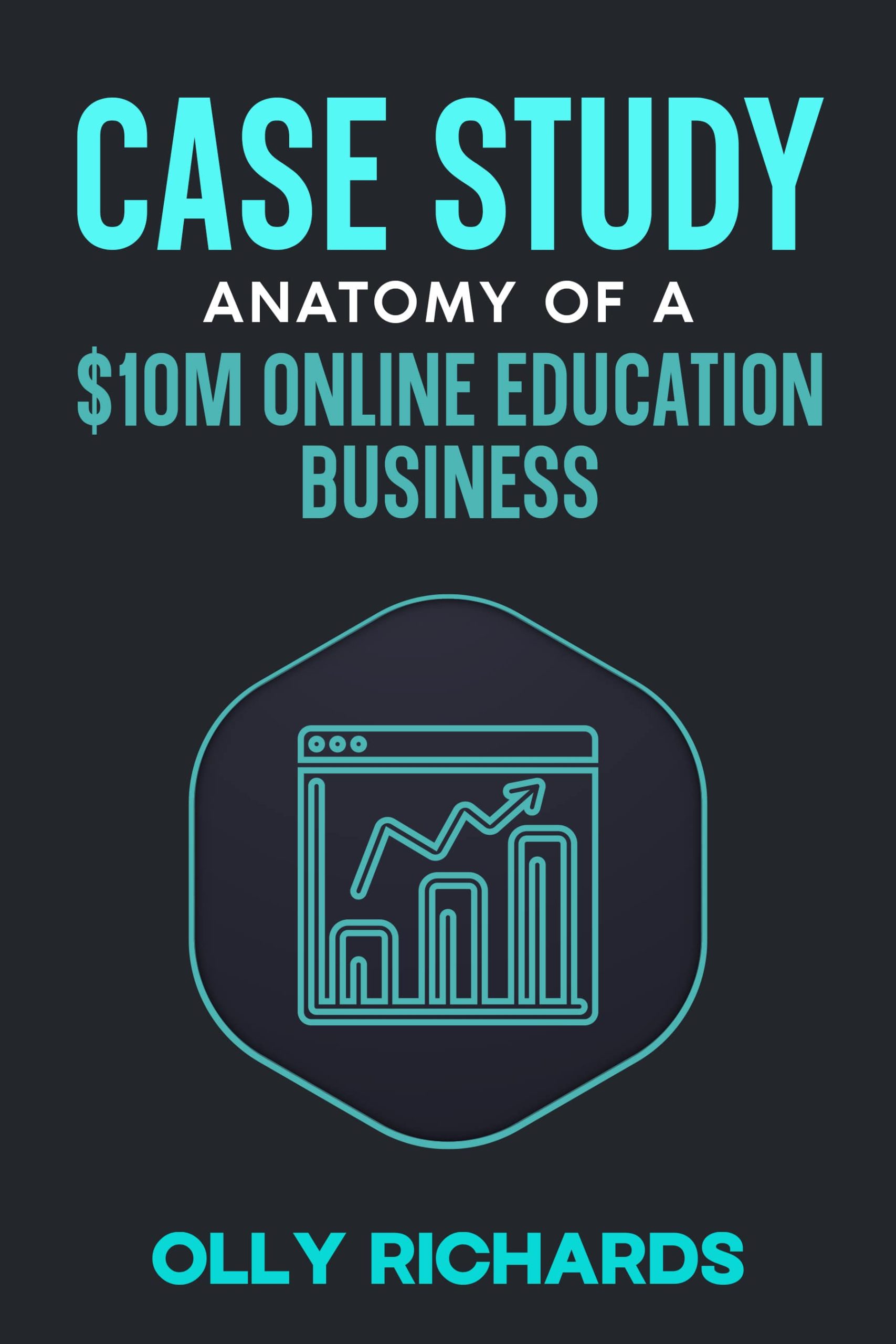Business advice tends to be all about helping you crush it...
Smash it out of the park…
Kick ass in the morning and take names in the evening.
But there's something just as important that I think we should be paying more attention to:
How to be completely unattached to your goals.
Because, although you have goals, and yes – you want to achieve them, becoming attached to goals is a dangerous game.

But why?
Well, that's what this article is all about.
For now, I want you to know:
Learning about attachment has been the single most impactful thing I’ve ever learned as an entrepreneur.
Because it’s shown me how to be happy while pursuing ambitious goals.
Today I thought I would get down, dirty and practical:
13 things I actually do to practice the mindset of non-attachment.
Hope it helps you enjoy your journey…
.
.
.
[Sidenote…]
This piece is quite long.
To make it easier to consume, I’ve made a Google Doc version, with the exact same content.
If you prefer to read it that way, you can find it here:
What is Attachment?

If you have anything you want to achieve in life, you’ll have goals.
Naturally, you’ll measure your success on achieving those goals.
But goals are future-based.
By definition, they haven’t happened yet.
Here’s the problem:
Happiness is grounded in the present, not in the future.
When entrepreneurs feel inexplicably anxious, empty or lost, it’s because their mind is permanently caught up in the future:
- “When I have $5M in the bank, then I’ll be sorted.”
- “When I’ve paid off my mortgage, I’ll feel safe.”
- “When I sell the company, then I’ll start on my bucket list.”
Ongoing anxiety or stress can be triggered by literally anything…
- Falling website traffic
- An unexpected invoice
- Trouble with an employee
These singular events can be perceived as threatening your future goals.
“If this employee problem doesn’t get resolved, we won’t achieve our target this year… I won’t achieve my goal of selling the company in 5 years… everything will burn down… my wife will leave me, take the kids, and I’ll end up sleeping under a bridge.”
(Think that’s extreme? Welcome to your non-conscious mind.)
Now, it’s very easy to dismiss all this as woo-woo nonsense, and just get on with building.
“This s%!# is hard enough, I don’t need feelings to get in the way!”
That was me for years.
But once I started to investigate how my mind works, the various anxieties I suffered from were laid bare like a turkey at Christmas.
It was so freaking obvious what was happening, and why:
I was attached to my goals.
Once I understood this, I could start working on the solution:
Non-attachment.
Being unattached to your goals doesn’t mean not striving to achieve them.
It means not attaching your sense of wellbeing to achieving them.
When you’re released from attachment to the future, you’re then free to figure out how to be happy right now.
(Which is a challenge all of its own!)
But we’ll start with getting unattached in the first place.
I’m going to tell you how I practise this personally.
I’ll spilt it into three categories:
- Mind
- Body
- Routine
I’m not totally sure these categories make sense, but that’s what I got for now.
Mind
1. You Are Not Your Thoughts

Many years ago, probably in my 20s, I got it into my thick head that I wanted to own a penthouse apartment in Marylebone, Central London.
A property like that costs around £20 million. (I’ve looked.)
Without realising it, I gradually started to associate success with owning a property like that.
Consciously, I knew that I don’t need it. Or even want it. Heck, even if I did buy it, I would instantly regret it for all kinds of reasons. (Maintenance, tax, sitting empty, etc.)
Even if I magically found £20 million down the back of the sofa, I would never spend it on a damn penthouse.
Far better things to spend money on.
And yet…
From time to time, when I least expect it, my brain starts thinking: “You failure! You never got that penthouse!”
And if I’m not careful, I can start beating myself up for not being successful enough to have it.
This harmful thought process happened to me once during a morning walk in Hobbitshire. I remember being completely consumed by thinking about the penthouse.
When I got back home, I walked through the front door and thought to myself:
“WTF just happened? I’ve just managed to ruin a beautiful walk… using nothing but the power of my brain!”
Thanks, brain!
I thought you were on my side!
Sometime later, this happened again on another walk.
But then I remembered something I’d recently read in a book:
You are not your thoughts; you are the observer of your thoughts.
This time, when the idea of that godforsaken penthouse entered my mind, I instantly caught it!
This is just a thought. It’s not me. I don’t have to react to it.
And an amazing thing happened…
I visualised the thought literally flying into my head, knocking around for a few moments, and then flying back out again, continuing its day…
Off to invade some other poor sucker.
I watched the thought fly away into the distance, as I refused to engage with it…
Leaving me in peace to enjoy my walk.
You are not your thoughts, you are the observer of your thoughts.
When you realise this, it gives you permission to stop reacting to unhelpful thoughts that you have.
Same with your goals…
Just because your mind is constantly taunting you with all your unfinished tasks…
Doesn’t mea you have to react.
You can train yourself to:
- observe the thought
- refuse to engage with it
- allow it to pass through
… leaving you as chilled as a penguin.
When you learn this, you can be gloriously unattached to all kinds of things that would otherwise dominate your mind, and be free to enjoy the present moment.
Next time you’re out on a walk, observe the thoughts that enter your mind.
Try not to react to them.
Be the observer of your thoughts.
Watch what happens next.
(For more on understanding your mind, read: The Untethered Soul, by Michael Singer.)
2. Measure Backwards
As we just saw, by linking your success with goals, you’re pinning your happiness on the future.
On things that have not happened yet.
But how can you ever be happy if the stuff that makes you happy hasn’t occurred yet?
You can’t.
So rather than measuring forward – the gap between where you are now, and where you want to be – measure backwards instead.
Reflect on everything you’ve achieved, how far you’ve come, everything you’re grateful for.
Allow that to define your success, and it’s hard not to let a smile spread across your face.
The gap between where you are now, and where you’ve come from, is the only reliable measurement of success, because it can actually be measured.
In 2015, I was living in Egypt teaching English. I was earning £800/mth.

For me, going from that to the life I have today is the biggest magic trick I’ll ever pull off.
Whatever I may achieve in the future…
First person on Mars, etc…
It won’t even come close to the impact of leaving a dead-end career, starting a business, and buying my freedom.
I think of this when my mind is invaded by thoughts of unachieved goals.
“I’ve come so far and that’s how I should measure my success!”
Sure, I care about my current goals, but I don’t need to be unhappy for not having achieved them yet.
Reflecting on how far I’ve come makes me grateful every single day.
How has your life changed for the better? What have you already achieved?
Chances are it’s far more than you give yourself credit for.
For more on measuring backwards, read: The Gap and the Gain, by Dan Sullivan and Ben Hardy.
3. Personal Definition of Success
So we know that you tend to link success with your goals.
But goals are a red herring…
You may not know it yet, but as soon as you achieve whatever goal you have, the goalposts will instantly move, sending you right back to square one.
You will never “arrive”.
The future is an unreliable narrator.
And so the best way to gauge success is by the present.
So, what does a successful present look like for you?
Have you even thought about it?
If you can make the “successful present” tangible, you can know for sure if you are being successful or not, which – you guessed it – can slowly begin to replace your dependence on future goals for your feelings of success.
I wrote down what being successful looks like for me:
I am being successful when…
- I can take a day off whenever I feel like it
- I can travel with no regard for cost
- I ONLY do work that excites me
- I exercise daily, fast 16 hours, drink alcohol rarely
- Passive business income comfortably exceeds lifestyle needs
- (you get the idea)
After writing this list, I was stunned:
I could achieve all my goals tomorrow, nothing will change. I’ll be successful then, but according to my definition, I’m successful now, dammit!
So what exactly am I hustling for?
Whatever your motivation for continuing to work, one thing’s for sure…
You can feel successful right now, by your own personal definition, leaving you free to enjoy the journey a lot more.
What are the elements of a successful life for you?
Make a list.
How many of them have do you already have?
(For more on this, again see The Gap and the Gain.)
4. Lists, Planning & Journalling
You might have noticed that much of the stuff we’ve talked about so far is in your head.
That’s no coincidence – this whole section is called “Mind” after all.
But the fact that so much is swilling around in your head, makes it unreliable.
So much of what passes through your head at any point is raw, unprocessed garbage.
Which is why getting stuff out of your head and down onto paper is so helpful.
Every Sunday, I do my weekly planning.
By the time Sunday comes along, there’s a lot of random stuff from the week floating around in my head.
It can be a bit overwhelming, actually.
(When important stuff is only in your brain, you risk forgetting it. And that risk is stressful.)
But things change fast when I do my weekly planning:
- I start with a big brain dump onto paper of everything that’s on my mind
- Then, I look at my goals to remind myself where I’m headed
- Next, I triage and prioritise everything from the brain dump according to my goals
- Finally, I map out my week
Bog standard weekly planning, really.
But it’s always amazing how this instantly de-stresses me, because I no longer risk forgetting important things with a memory slip.
It’s all there in black-and-white on paper – safe and sound.
Brain relaxes.
For the same reason, I use lists for everything.
Whenever anything’s on my mind, I get it right down onto my list.
Brain relaxes.
For the same reason, I do 15 minutes of journalling every morning.
The process of journalling clarifies your thoughts and teaches your brain:
“Hey dude, everything’s under control.”
All this frees up your brain to be present in the here-and-now, not worrying about the future.
Do you have a reliable list-making or planning process?
If not, please give it a try.
5. Meditation

I know this section is going to be met with eye-rolling, and I risk losing people by coming off like some kind of enlightened tech bro.
So I’ll just say this…
I have a love-hate relationship with meditation.
For the most part, I fail to do any.
Since I first tried meditating about 10 years ago, and vowed to do it every day, I estimate I’ve only managed to meditate on 5% of days.
When it comes to meditation…
I’m a joke.
A complete laughing-stock.
The David Brent of meditation.
Anyone who listens to anything I have to say about meditation needs their brain examined!
However…
When I actually sit down and do it…
I think it’s the most powerful practice on the planet for happiness and well-being.
I mean that in all seriousness.
After spending 10 minutes meditating, you can’t help but look on the world in a completely different light, and any attachment to the future will quickly dissipate, leaving you with a warm glow and full of love.
So look…
I’ll tell you what’s working for me right now, but please understand that even two weeks ago, I wasn’t doing any of this, and I may well have given up by the time you read this.
So you really have to find what works for you.
But what’s really working for me right now is using the Waking Up app and simply doing the 10 minute guided daily meditation, first thing in the morning.
I get up early to do it.
And it’s 1,000% worth it.
Please try it.
Body
After the quagmire that is your mind, this section on body is going to seem a lot simpler.
But it’s just as important.
I can directly link the amount of physical activity I do with my ability to be present, and therefore less attached to future goals.
6. Walking

I walk a lot.
It started in lockdown, when I was cooped up in a North London flat, suffering from insomnia.
I’d be wide-awake at 5am, and started getting up and going for long walks around my neighbourhood to burn off some of the restlessness.
I’d walk for 1-2 hours.
Sometimes 3 hours.
At first, I would listen to podcasts.
But I soon started leaving my phone at home.
One of my big incentives for moving from London to Hobbitshire was the incredible walks I get to do on a daily basis.
Walking changed my life like no other activity I can think of. Walking is a bit like meditation. When you finish, you feel fantastic.
But it also clears your head.
This “grounding” helps to balance the influence of the unreliable future, and keeps you firmly in the present.
If you’ve never tried daily walks, I urge you to try it for a week.
(Just leave your phone at home!)
7. Be In Nature
Let the clichés roll!
But like most clichés, they exist for a reason.
In this case, being in nature connects you with the real world.
Being caught up in your head is a challenge for entrepreneurs at the best of times.
Spending more time in nature is well-documented as a stress-reliever, like the Japanese forest bathing tradition.
But for me, it’s simpler.
You just see so much stuff when you’re out in nature.
Trees, animals, landscapes…
It grounds you in the world you live in, and it gets much, much harder to worry about Google Analytics when you’re watching the sun setting on a clifftop walk.

Do this a bit more regularly, your attachment to business outcomes will soften considerably, as you realise there’s so much beauty right under your nose.
(Bonus: Combine with a walking habit and you get two-for-one!)
8. Exercise daily
Not what you may think, this one.
So obviously exercise is good for you… Don’t need me to tell you that.
Thing is…
When I do vigorous daily exercise (gym, running, etc), I’m motivated to keep it up and not break the streak.
The effect?
It gives me something else in daily life to be proud of, which makes me feel less reliant on achieving future goals.
“I’m doing good in the here and now, so who cares what happens in five years?”
In other words, the more you have going on in the present, the less you rely on the future for your feelings of accomplishment.
Daily exercise is great for this.
Routine
Your habits can be a positive or negative influence on your well-being.
Bad habits can reinforce your attachment to goals.
Good habits can help you remain unattached and present.
Entrepreneurs need to pay particular attention to habits, because they have so much going on.
Here are some random habits that have massively helped me stay unattached…
9. Stay Away From Online Banking
Money can play havoc with our emotions, because we associate money so strongly with success.
As a result, many people check their banking compulsively.
This is bad.
Regularly checking your bank balance reinforces an unhelpful connection between finance and well-being.
Does finance matter?
Of course it does.
But effective financial management happens in cycles of months and years, not hours and days.
You check your bank balance because it makes you feel safe and in control.
But you’ll be more effective if you look at your finances less often, because you will spot trends and make longer-term decisions, instead of reacting to your bank balance on any given day.
So set strict guidelines on when you check certain things.
For me:
- P&L - once a month
- Planned vs actual - once a month
- Bank balance - every two weeks
- Personal net worth - every 3-6 months
Since I set these guidelines, something very powerful happened:
I worried less about finances.
I became less attached to financial outcomes.
Rather than being reactive to daily events, I started to rely on our financial reporting for my information.
(I had to seriously upgrade our finance team to get our reporting up to standard, but that’s a story for another day.)
Of course, this doesn’t change financial reality of the business…
But it’s a much happier place for you to be personally, and you WILL make more mature decisions.
Be honest, how often do you check your banking?
What boundaries would make sense?
Write down those boundaries. I go far as to have specific calendar events where I look at finances – it helps me stay on the straight and narrow.
10. Secure Financial Systems
Of course, in order to stay away from your banking, you have to have confidence in your financial systems.
You need to know that your finances are managed in such a way that the business is secure, you won’t run out of money, and any problems will be caught early.
Here are the basics of how we structure our finances at StoryLearning in order to be fairly robust:
- KPI dashboard (weekly) - 4-5 key numbers (e.g. revenue) we update weekly in a traffic light system (example). Functions like an early-warning system in case anything breaks. (I don’t look at this personally, but the leaderships team does.)
- Tax contingencies (monthly) - Projected sales tax and corporation tax liabilities from the previous month are reported and moved immediately to a dedicated bank account
- Full financial reports (P&L, cashflow, balance sheet) (monthly) - Tells me what happened last month in the business. Means that I never need to check sales reports.
- Planned vs actuals - The one place I tend to look more closely at numbers. How did we perform last month vs budget? We discuss any variations and look at trends and take action if necessary.
- Emergency fund - 6 months of operating expenses maintained at all times in a dedicated account, out of sight.
I find this covers everything I need in order to feel secure about our overall finances:
- we always have cash
- I know about any emergencies
- taxes are covered from day one
- I understand business performance at a high level
None of this absolves me of responsibility for the numbers.
But it does mean that I get to spend 29 days a month not worrying about them.
Which means I’m less reactive.
The more reactive you are, the more you tend to worry about the future.
So, secure systems help you stay grounded and give you the mental freedom to be present in whatever you’re doing, without being attached to future performance.
11. Get Off Your Phone

Ever since I got my first iPhone, I’ve been addicted.
I admit it.
Not willingly, I hasten to add. But addicted I was. Just like everyone else.
Of course, I’ve tried hundreds of times to set boundaries.
Never worked.
Until I tried an app called Opal, which ruthlessly blocks all the apps I choose for most of my day:
- 6-8am: “me” time
- 9-12pm: deep work time
- 9pm: wind down time
It blocks everything, and it’s brutal.
But it works, dammit!
My screen time is down 80%, and I’m so much better off for it.
How does this help you stay unattached?
Because all the time you’re on your phone, you’re hooking yourself on dopamine. This means you become more reactive to stimuli in general.
Cultivating non-attachment means precisely the opposite…
Not reacting to stuff.
Which makes you happier.
Simple.
(Not an affiliate link, but I think I might get free months or something.)
It’s not free, but by God it’s worth it.
You’ll thank me later.
12. Plan Cool Stuff
In the early days of practising non-attachment, I found myself getting FOMO a lot.
With my phone pinging less…
Silent walks without podcasts…
And a general focus on the present moment over the future…
I found myself thinking:
“Am I missing out on stuff? Is life just passing me by?”
This is what happens when you reevaluate your life. It’s a bit like learning to live all over again.
But I got FOMO nonetheless.
So I started to get better at planning.
I do this planning on a Saturday morning at my favourite café, when my daughter is at her theatre group.
I sit down and plan cool s*** I want to do:
- arranging dinners
- things with my family
- travel
- friends I want to catch up with
I just work my way through the list and plan things out, often months in advance.
As a result, I always have a bunch of things I’m really looking forward to.
Without pesky feelings of FOMO creeping in, this makes it easier to enjoy the present moment.
But you know what?
Doing things this way also means that I do better stuff, in general!
Rather than just reacting to random invitations, things that pop up on Facebook, or being so caught up in work that I forgot to plan anything at all…
Instead, I just plan high-quality things that I really want to do.
With lots of things to look forward to in the coming months, it reinforces that whole posture of not being so reliant on achieving your goals for your feelings of accomplishment.
(For more on this: Read 4,000 Weeks, by Oliver Burkeman.)
13. Non-Consumerism
How about a wildcard to finish off this glorious list?
A personal goal for myself for 2024:
Buy myself nothing new
Yes, you read that right.
It’s inspired by my friend Julie, who told me last year she was practising a year of non-consumption:
- no new clothes
- no takeout coffees
- no midnight online shopping
I was inspired by this, although I didn’t know exactly why at the time.
However, as the months went by, I found myself really wanting to give this a try.
Julie was doing this for far more principled reasons than me, but I started to see how this would also help me with non-attachment.
See, as I’ve made more money, I’ve noticed myself spending more and more time thinking about things I could do with that money…
Everything from buying that bloody Marylebone penthouse, to a new watch, to shopping at Selfridge’s instead of Primark… whatever.
On the one hand, I do appreciate quality more than before.
On the other hand, I know that this kind of consumerism is ultimately empty.
It’s not where you find meaning.
“But so what? If you can afford it…?”
Here’s why…
Because this encourages a future-conditioned mindset — “When I buy this thing, then I will feel happier.”
Like creating itches that need to be scratched.
And this drags your attention out of the present moment, which is where you should be looking for your fulfilment.
So, what I found interesting about this challenge, was that if I can condition my mind to simply stop wanting things, it should exponentially increase well-being.
I mentioned this challenge at a dinner recently, and it got an enthusiastic response.
Really struck a chord with people, which is telling.
One friend suggested keeping a list of everything that I thought about buying (but didn’t) — toting that up at the end of the year would make for very interesting reading!
Of course, all this also has the benefit of helping the environment and saving money.
But mostly, I’m interested in guarding my mind from the effects of money and mindless consumerism, and optimising for well-being.
I’m a couple of weeks in already, and I must say I’m enjoying it.
Maybe I’ll report back in a year on how it went, if you’re interested.
To what extent do you distract yourself with buying stuff?
How might this behaviour be reinforcing certain needs?
Would you experiment with some limits on this?
Conclusion
Right.
Well, I had no idea this was going to be so long.
But writing is often like this…
Once you get started, it becomes clear the piece has a life of its own. The story needs to be told. Things have to be gotten off your chest.
When I first started writing about things like attachment, I thought people would think I was mad:
“Real entrepreneurs don’t have these problems! Real entrepreneurs are tougher than that!”
Perhaps I subconsciously believed this too.
But since putting my thoughts out there, I’ve been inundated by people who tell me that they read those particular articles from head to toe (multiple times), share them with their friends, and then reply to me personally.
So I’m not alone.
Many entrepreneurs struggle with things that they wouldn’t talk about publicly, which reinforces the impression that anyone who does struggle must have something wrong with them.
Well…
I’ve got plenty wrong with me…
But, I’m proud that I’ve learnt to understand and deal with the attachment issue.
So, if this helps you in any way, then I’ll be happier than a witch in a broom factory.
To summarise:
While it’s essential to have goals and a plan to achieve them, becoming overly attached to these outcomes can cause you to suffer in the present.
This suffering can range from a sense of feeling “lost”, to anxiety or downright unhappiness.
Entrepreneurs have this bad because their lives revolve around big future-based goals.
Being happy with their lot in life is not part of the entrepreneur’s DNA.
This can make it hard to be at peace with the present.
But learning to be content in the present is the only way to be happy while pursuing ambitious goals.
One way to do this is by practising non-attachment.

I shared 13 practical ways to cultivate non-attachment, in three categories:
- Mind: Techniques and mindsets that help in detaching from the constant pursuit of goals.
- Body: Physical practices that aid in maintaining a balanced perspective.
- Routine: Daily habits that reinforce a non-attached approach to life and work.
Practicing non-attachment isn’t about giving up on your goals; it’s about not letting these goals dictate your happiness or sense of self.
It’s a shift from future-focused anxiety to present-moment contentment.
It’s about finding that sweet spot where you’re driven but not bound by your aspirations.
As you can probably tell, it’s been one hell of a journey for me to discover all this stuff, and I still grapple with it from time to time.
But I’ve loved writing this, and hope you find something inside to help you make more out of this crazy life of entrepreneurship.
If you enjoyed this guide, I’d love for you to share it with a friend who you think might need it…
In an entrepreneur group you’re in…
Or wherever you think it would be helpful.
You can copy the URL of this page, or send a link to the Google Doc:
https://docs.google.com/document/d/1ssLE9PVu0QXJW2AwSz--xnDNvERtUbgpjElblnFMs-M/edit?usp=sharing
It works all the same.
So, what did you think?
Feel free to leave me a comment below with your thoughts. Go on, lemme have it!
Namaste,
Olly
CASE STUDY: Blueprint Of A $10m Online Education Business:
Join my free newsletter for online educators and I'll send you the case study immediately...
We will protect your data in accordance with our data policy!

